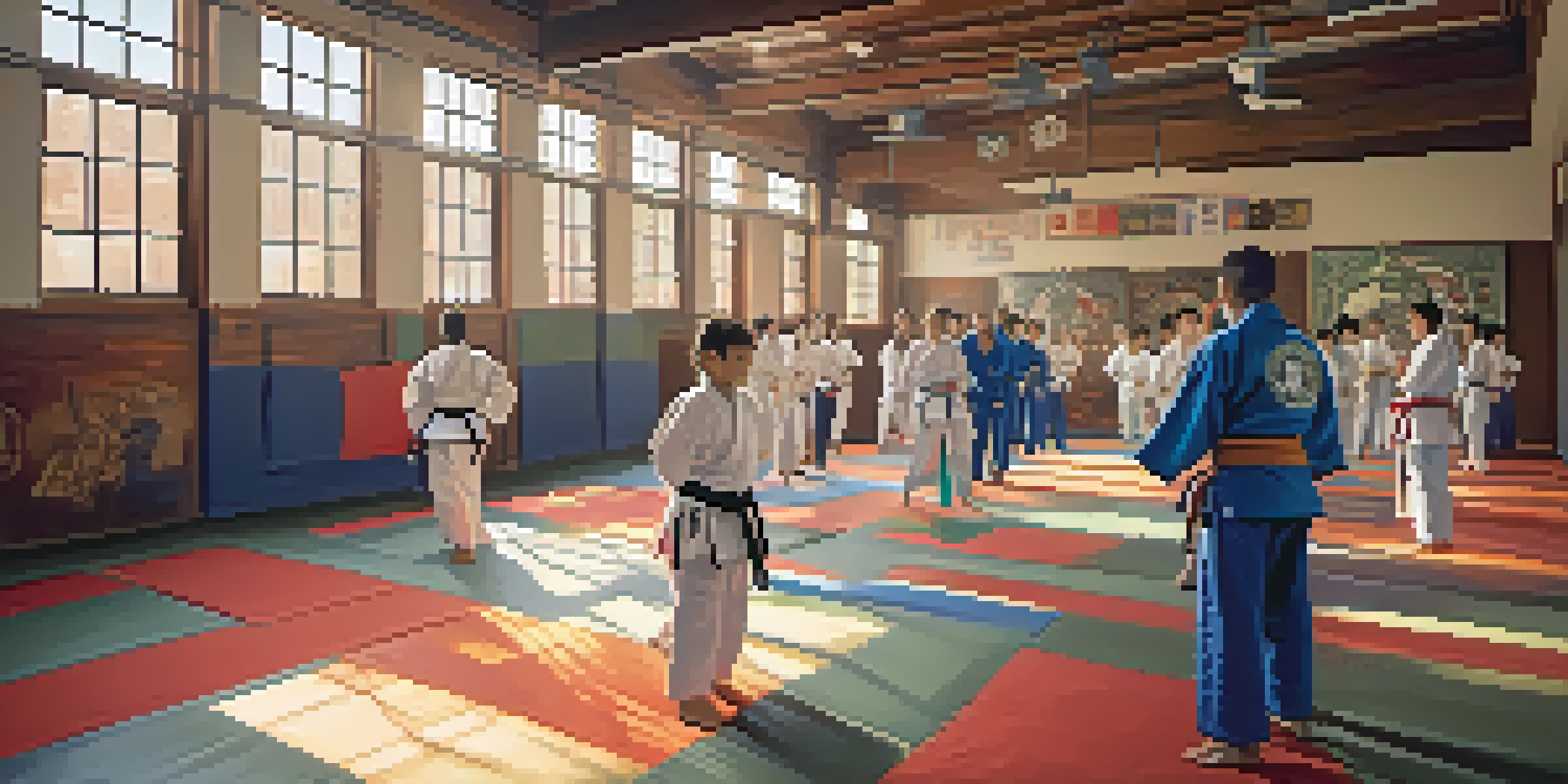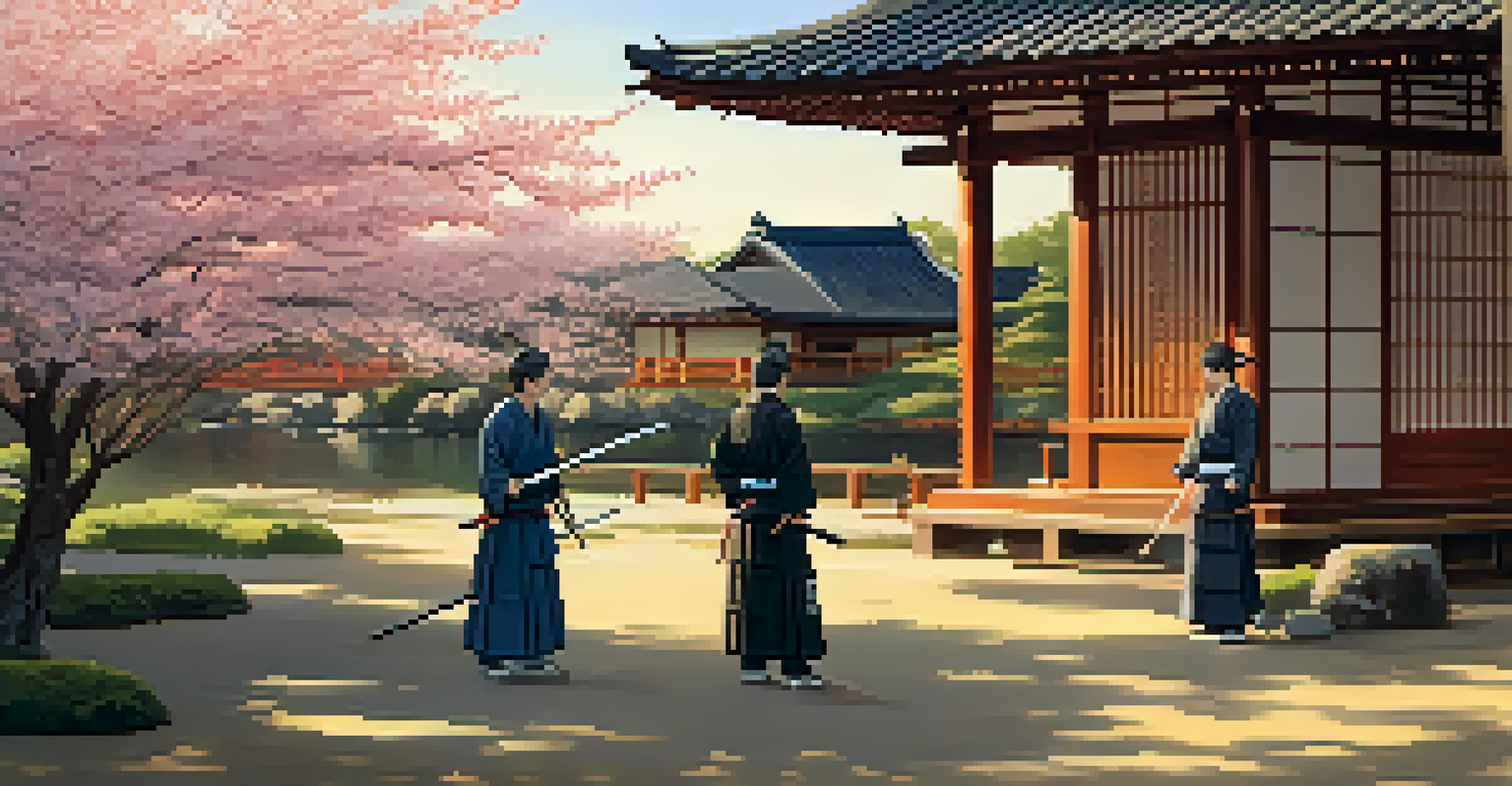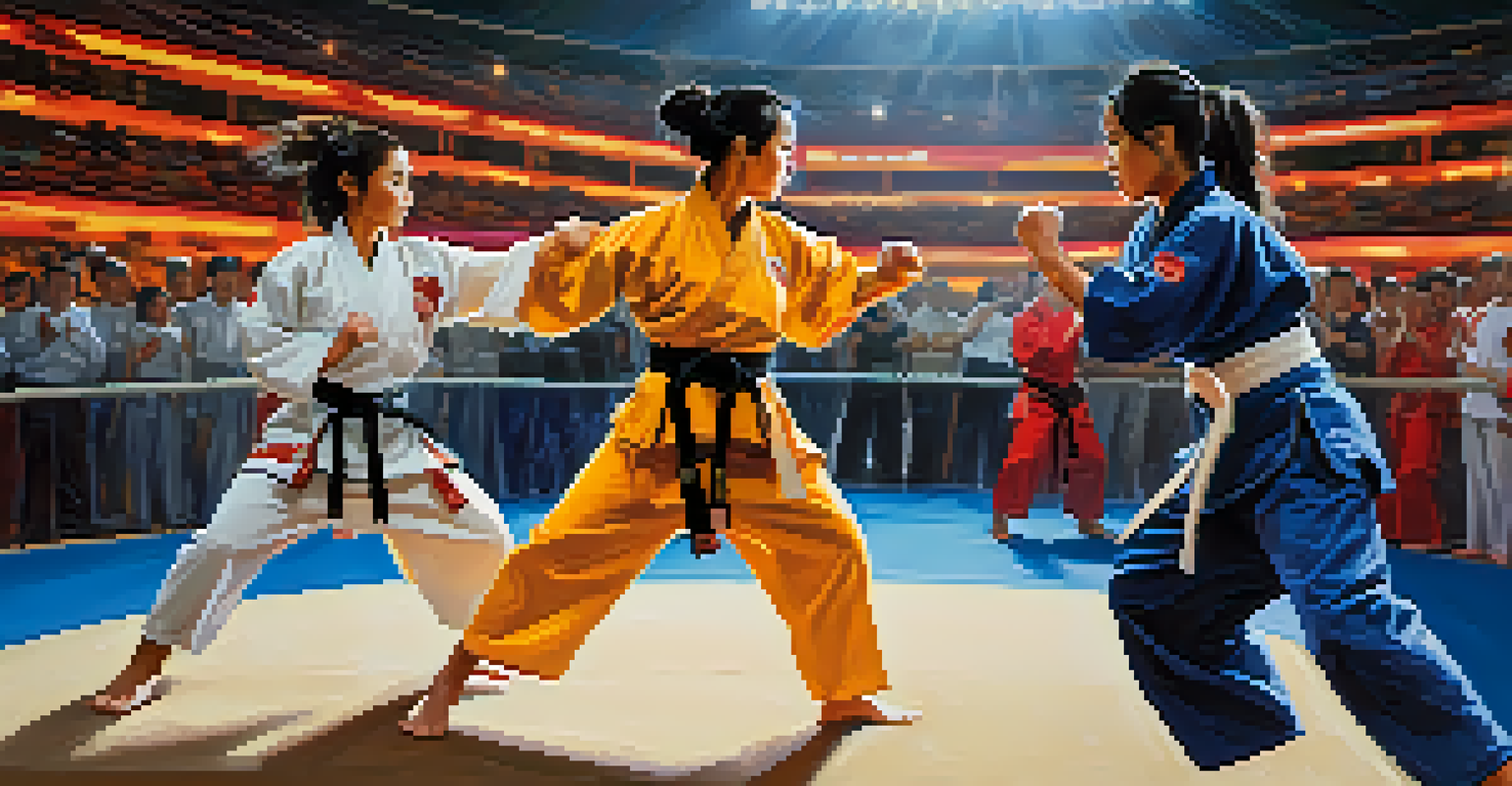Martial Arts and Identity: Cultural Expressions Worldwide

Understanding Martial Arts as Cultural Expressions
Martial arts are more than just physical combat; they're a reflection of cultural values, history, and philosophy. Each style often carries the essence of its home country, revealing societal norms and traditions. For instance, Brazilian Jiu-Jitsu emphasizes adaptability and resilience, mirroring Brazil's diverse social fabric.
Martial arts are not just about fighting; they are about self-discovery and personal growth.
When practitioners engage in martial arts, they participate in a living tradition that connects them to their cultural roots. This connection fosters a sense of belonging and identity, especially for those living in multicultural societies. As students learn techniques, they also absorb the stories and customs tied to those movements.
Moreover, martial arts can serve as a bridge between cultures, allowing for a shared understanding of different traditions. When people from various backgrounds come together to learn a style, they exchange not only skills but also insights into their respective cultures, enriching the martial arts experience.
Martial Arts in Asia: A Historical Perspective
In Asia, martial arts have deep historical roots that intertwine with religion, philosophy, and community life. For example, Kung Fu in China is not just about combat; it is steeped in Zen Buddhism and Confucian ideals, emphasizing self-discipline and moral integrity. This perspective illustrates how martial arts can embody a society's values.

Similarly, Japan's Samurai culture produced disciplines like Kendo and Aikido, which focus on honor and respect. These arts tell stories of the past, where the warrior ethos shaped the identity of a nation. Practitioners today honor this legacy while adapting the teachings to contemporary life.
Martial Arts Reflect Cultural Values
Each martial arts style embodies the cultural values and traditions of its origin, fostering connection and identity among practitioners.
As these martial arts spread globally, they bring with them their rich historical narratives. This transfer of knowledge allows practitioners outside of Asia to connect with these ancient cultures, fostering appreciation and understanding of their philosophies.
The Role of Martial Arts in African Identity
In many African cultures, martial arts play a vital role in community and identity formation. Traditional forms, such as Capoeira in Brazil, have roots in African heritage and illustrate the resilience of culture even in the face of displacement. This art form combines dance, music, and fighting, showcasing the creativity and spirit of African communities.
The ultimate aim of martial arts is not having to use them.
Additionally, many African countries have their own unique martial traditions, like Dambe in Nigeria, which celebrates strength and agility. These practices not only serve as a means of self-defense but also as a way to preserve cultural heritage and transmit values to future generations.
Martial arts competitions often become community events that reinforce social bonds and cultural pride. Through these gatherings, people celebrate their identity while educating others about their rich heritage, fostering a sense of unity and belonging.
Martial Arts as a Tool for Empowerment in the West
In Western societies, martial arts have increasingly become a tool for empowerment, especially among marginalized communities. Many people find confidence and strength through disciplines like Taekwondo and Karate, transforming not just their bodies but also their self-perception. This empowerment is crucial in helping individuals break free from stereotypes and societal limitations.
Moreover, martial arts training often emphasizes respect, discipline, and perseverance, values that resonate deeply with many practitioners. These principles can help individuals navigate the complexities of modern life, reinforcing a sense of self-worth and capability.
Martial Arts Empower Communities
In various societies, martial arts serve as a tool for empowerment, helping individuals gain confidence and break societal stereotypes.
As martial arts schools become more inclusive, they create environments where diverse identities can flourish. This inclusivity allows practitioners to share their unique experiences, leading to a richer understanding of identity and community within the martial arts space.
Gender and Martial Arts: Challenging Stereotypes
Gender dynamics in martial arts are evolving, with more women taking up various disciplines traditionally dominated by men. This shift challenges stereotypes and promotes the idea that strength and skill are not limited by gender. Women in martial arts often serve as role models, inspiring younger generations to pursue their interests without fear of judgment.
Styles like Judo and Krav Maga actively encourage female participation, illustrating that martial arts can be powerful tools for self-defense and empowerment. By learning these skills, women gain confidence and a sense of security, which is essential in navigating a world that can often be hostile.
Furthermore, female practitioners are increasingly visible in competitions and exhibitions, showcasing their skills on a global stage. This visibility not only challenges existing norms but also fosters a more inclusive martial arts community that values diversity in all its forms.
Martial Arts and Cultural Exchange in the Modern World
In today's globalized world, martial arts serve as a unique platform for cultural exchange. As people travel and share their knowledge, they bring various styles and philosophies together, creating hybrid forms that reflect a blend of traditions. This exchange not only enriches the practice itself but also fosters greater cross-cultural understanding.
For example, the rise of mixed martial arts (MMA) showcases techniques from diverse disciplines, highlighting how practitioners can learn from one another. This fusion not only enhances athletic performance but also encourages respect and appreciation for different cultures and fighting styles.
Cultural Exchange Through Martial Arts
Martial arts facilitate cultural exchange in a globalized world, blending diverse traditions and fostering greater understanding among communities.
Martial arts events and competitions now attract a global audience, creating spaces for dialogue and interaction. Through these shared experiences, individuals can develop a deeper appreciation for diverse cultural expressions, strengthening the bonds between communities worldwide.
The Future of Martial Arts and Cultural Identity
As we look to the future, martial arts will continue to evolve, reflecting the changing dynamics of cultural identity. New styles may emerge, influenced by globalization and technological advancements, yet the core values of respect, discipline, and community will likely endure. This adaptability ensures that martial arts remain relevant in a fast-paced world.
Furthermore, as societies become increasingly diverse, martial arts will play a crucial role in fostering inclusivity and understanding. Schools and organizations that prioritize cultural education will help practitioners appreciate the rich histories behind the techniques they practice.

Ultimately, martial arts will continue to serve as a powerful medium for expressing cultural identity, fostering empowerment, and creating connections across borders. As practitioners embrace this journey, they will not only honor their own heritage but also celebrate the diverse tapestry of human experience.